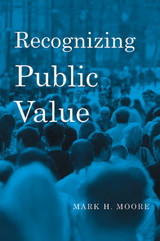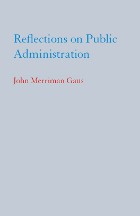5 start with R start with R

Mark H. Moore’s now classic Creating Public Value offered advice to public managers about how to create public value. But that book left a key question unresolved: how could one recognize (in an accounting sense) when public value had been created? Here, Moore closes the gap by setting forth a philosophy of performance measurement that will help public managers name, observe, and sometimes count the value they produce, whether in education, public health, safety, crime prevention, housing, or other areas. Blending case studies with theory, he argues that private sector models built on customer satisfaction and the bottom line cannot be transferred to government agencies. The Public Value Account (PVA), which Moore develops as an alternative, outlines the values that citizens want to see produced by, and reflected in, agency operations. These include the achievement of collectively defined missions, the fairness with which agencies operate, and the satisfaction of clients and other stake-holders.
But strategic public managers also have to imagine and execute strategies that sustain or increase the value they create into the future. To help public managers with that task, Moore offers a Public Value Scorecard that focuses on the actions necessary to build legitimacy and support for the envisioned value, and on the innovations that have to be made in existing operational capacity.
Using his scorecard, Moore evaluates the real-world management strategies of such former public managers as D.C. Mayor Anthony Williams, NYPD Commissioner William Bratton, and Commissioner of the Minnesota Department of Revenue John James.

“In this classic, Gaus writes perceptively of the ‘ecology’ of public administration and its relationship to the rise of the administrative state. He recounts how crises and changes in people, place, physical technology, social technology, and philosophy in the first half of the 20th century led citizens repeatedly to look to government for relief. Politicians, in turn, created or expanded the powers of public agencies.” —Journal of Management History

Contract management is a critical skill for all contemporary public managers. As more government duties are contracted out, managers must learn to coordinate and measure the performance of private contractors, and to write contract requirements and elicit bids that obtain important services and products at the best possible price and quality. They must also learn to work in teams that include both public and private sector partners.
The Responsible Contract Manager delves into the issues of how to ensure that the work done by private sector contractors serves the public interest and argues for the necessity of making these organizations act as extensions of the public sector while maintaining their private character. Government contract managers have a unique burden because they must develop practices that ensure the production advantages of networked organizations and the transparency and accountability required of the public sector.
The Responsible Contract Manager fills a major gap in public management literature by providing a clear and practical introduction to the best practices of contract management and also includes a discussion of public ethics, governance and representation theory. It is an essential guide for all public management scholars and is especially useful for students in MPA graduate programs and related fields.

The prevailing notion that the best government is achieved through principles of management and business practices is hardly new—it echoes the early twentieth-century "gospel of efficiency" challenged by Dwight Waldo in 1948 in his pathbreaking book, The Administrative State. Asking, "Efficiency for what?", Waldo warned that public administrative efficiency must be backed by a framework of consciously held democratic values.
Revisiting Waldo's Administrative State brings together a group of distinguished authors who critically explore public administration's big ideas and issues and question whether contemporary efforts to "reinvent government," promote privatization, and develop new public management approaches constitute a coherent political theory capable of meeting the complex challenges of governing in a democracy. Taking Waldo's book as a starting point, the authors revisit and update his key concepts and consider their applicability for today.
The book follows Waldo's conceptual structure, first probing the material and ideological background of modern public administration, problems of political philosophy, and finally particular challenges inherent in contemporary administrative reform. It concludes with a look ahead to "wicked" policy problems—such as terrorism, global warming, and ecological threats—whose scope is so global and complex that they will defy any existing administrative structures and values. Calling for a return to conscious consideration of democratic accountability, fairness, justice, and transparency in government, the book's conclusion assesses the future direction of public administrative thought.
This book can stand alone as a commentary on reconciling democratic values and governance today or as a companion when reading Waldo's classic volume.

READERS
Browse our collection.
PUBLISHERS
See BiblioVault's publisher services.
STUDENT SERVICES
Files for college accessibility offices.
UChicago Accessibility Resources
home | accessibility | search | about | contact us
BiblioVault ® 2001 - 2024
The University of Chicago Press









